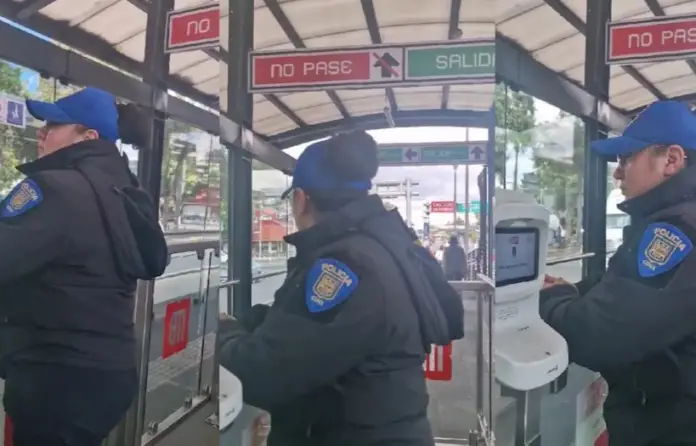Although one of the slogans of public transport in Mexico City is to be more inclusive, a woman did not hesitate to expose the moment in which a police officer had denied her access to the Metrobús facilities because she was traveling with her emotional support dog, a situation that generated outrage on social networks.
According to the affected person, the events would have occurred around 1:120 p.m. on Saturday, January 11, when Sara Ortega published on her official Twitter account, now X, the exact moment in which she wanted to enter the Eduardo Molina station, on Line 5 in the eastern part of the capital, but when the security officer noticed the animal, she denied access.
For the girl, it was a total display of discrimination and violence against her and against those people with specific needs who want to travel from this station and who have encountered the policewoman.
What happened?
According to what was shown in her posts (which she proceeded to delete a few hours later), Sara Ortega indicated that she was the victim of insults and aggression by the officer who refused to allow the dog to enter without allowing her companion to certify and justify its use.
“I was almost about to enter, when the officer told me that I could not enter with my dog (…) she shouted at me, insulted me and left me talking to myself, which caused me an anxiety attack,” she wrote in her post.
In response, the Metrobús responded: “Hello @saraaortega, thank you for your report. To enter with assistance animals you must always carry the document that supports it. If you do not have it, the pet must accompany you in a carrier.”
In response, the young woman indicated that she has the appropriate certification that requires her to bring her assistance dog, but that they still refused. Later, she was verified and was able to enter without any problems, but stating that one of her relatives had to go get her since her anxiety attack made it impossible for her to continue with her activities during the day.
How to apply for a permit for an emotional support dog in CDMX
In Mexico City, emotional support dogs are recognized for their ability to provide well-being to people with various emotional or psychological conditions. Although there is no official government process to certify these animals, it is essential to follow certain steps to ensure their acceptance in public spaces and means of transportation.

- Personal and Professional Evaluation
Before designating your dog as an emotional support animal, it is advisable to consult with a mental health professional. This specialist can evaluate your situation and determine if the company of a dog is beneficial for your emotional well-being. Although in Mexico it is not mandatory to present a letter from a mental health professional to recognize an emotional support animal, having this support can be useful in specific situations.
- Documentation and Certification
Although there is no official certification issued by the government, various organizations offer services to accredit your dog as an emotional support animal. For example, the Mexican Association of Service Animals (AMAS Mexico) provides identifications that facilitate access to different places. To obtain this accreditation, the following is generally required:
Up-to-date vaccination card: Make sure your dog is up to date with its vaccinations, especially anti-rabies.
Health certificate: Issued by a veterinarian, indicating that the animal is in good health.
Behavioral evaluation: Some organizations may request an evaluation to confirm that the dog has an appropriate temperament and is suitable for interacting in public environments.
- Access to Public Spaces and Transportation
In Mexico, emotional support animals must be allowed in public spaces and on means of transport, including domestic flights. There is no weight or size limit for these animals when they accompany people with disabilities. However, it is essential that the dog maintains appropriate behaviour and that hygiene standards are respected.
- Additional Considerations
Training: Although emotional support dogs do not require specialised training like service dogs, it is essential that they are sociable and well-educated to behave correctly in various environments.
Hygiene: Keep your dog clean and make sure that it does not give off strong odours or shed excessively. In case of shedding, consider using pro-hygiene suits that retain hair and allow air to enter.
Responsibility: As an owner, you are responsible for your dog’s behaviour. Make sure that it does not cause discomfort or pose a risk to other people.
- Procedure for Traveling with Your Emotional Support Dog
If you plan to travel with your emotional support dog, it is important to know the airline policies. For example, Viva Aerobus allows emotional support dogs and cats to travel for free, as long as the established requirements are met.
Although in Mexico City there is no official procedure to certify a dog as an emotional support animal, following these steps will help you guarantee its acceptance in various spaces and situations. It is essential to act responsibly and make sure that your dog is in optimal condition to perform its role as an emotional support animal.
Source: infobae




